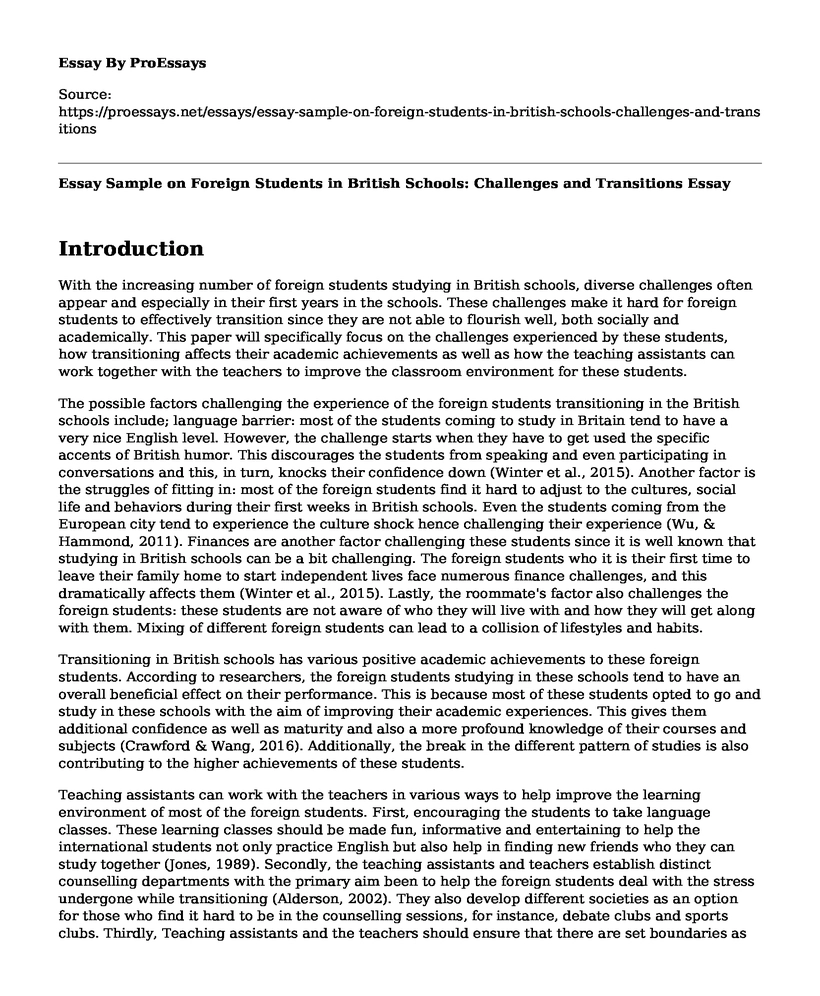Introduction
With the increasing number of foreign students studying in British schools, diverse challenges often appear and especially in their first years in the schools. These challenges make it hard for foreign students to effectively transition since they are not able to flourish well, both socially and academically. This paper will specifically focus on the challenges experienced by these students, how transitioning affects their academic achievements as well as how the teaching assistants can work together with the teachers to improve the classroom environment for these students.
The possible factors challenging the experience of the foreign students transitioning in the British schools include; language barrier: most of the students coming to study in Britain tend to have a very nice English level. However, the challenge starts when they have to get used the specific accents of British humor. This discourages the students from speaking and even participating in conversations and this, in turn, knocks their confidence down (Winter et al., 2015). Another factor is the struggles of fitting in: most of the foreign students find it hard to adjust to the cultures, social life and behaviors during their first weeks in British schools. Even the students coming from the European city tend to experience the culture shock hence challenging their experience (Wu, & Hammond, 2011). Finances are another factor challenging these students since it is well known that studying in British schools can be a bit challenging. The foreign students who it is their first time to leave their family home to start independent lives face numerous finance challenges, and this dramatically affects them (Winter et al., 2015). Lastly, the roommate's factor also challenges the foreign students: these students are not aware of who they will live with and how they will get along with them. Mixing of different foreign students can lead to a collision of lifestyles and habits.
Transitioning in British schools has various positive academic achievements to these foreign students. According to researchers, the foreign students studying in these schools tend to have an overall beneficial effect on their performance. This is because most of these students opted to go and study in these schools with the aim of improving their academic experiences. This gives them additional confidence as well as maturity and also a more profound knowledge of their courses and subjects (Crawford & Wang, 2016). Additionally, the break in the different pattern of studies is also contributing to the higher achievements of these students.
Teaching assistants can work with the teachers in various ways to help improve the learning environment of most of the foreign students. First, encouraging the students to take language classes. These learning classes should be made fun, informative and entertaining to help the international students not only practice English but also help in finding new friends who they can study together (Jones, 1989). Secondly, the teaching assistants and teachers establish distinct counselling departments with the primary aim been to help the foreign students deal with the stress undergone while transitioning (Alderson, 2002). They also develop different societies as an option for those who find it hard to be in the counselling sessions, for instance, debate clubs and sports clubs. Thirdly, Teaching assistants and the teachers should ensure that there are set boundaries as well as house rules to ensure that every student has their own space. They should also ensure that they listen and sort out any roommate issue faced by most of the foreign students as this can significantly affect their performance in the class.
References
Alderson, P. (2002). Students' rights in British schools. Routledge.
Crawford, I., & Wang, Z. (2016). The impact of placements on the academic performance of the UK and international students in higher education. Studies in Higher Education, 41(4), 712-733.Retrieved from http://researchspace.bathspa.ac.uk/4374/1/4374.pdf
Jones, A. P. (1989). 17 Language awareness in British schools. Dialect and education: Some European perspectives, 53, 269.
Peelo, M., & Luxon, T. (2007). Designing embedded courses to support international students' cultural and academic adjustment in the UK. Journal of Further and Higher Education, 31(1), 65-76.Retrieved from https://www.tandfonline.com/doi/abs/10.1080/03098770601167930
Winter, J., Turner, R., Gedye, S., Nash, P., & Grant, V. (2015). Graduate teaching assistants: responding to the challenges of internationalisation. International Journal for Academic Development, 20(1), 33-45.Retrieved from https://pearl.plymouth.ac.uk/bitstream/handle/10026.1/4292/IJAD%20with%20ident%20features.pdf?sequence=1
Wu, W., & Hammond, M. (2011). Challenges of university adjustment in the UK: a study of East Asian Master's degree students. Journal of Further and Higher Education, 35(3), 423-438.Retrieved from https://www.tandfonline.com/doi/abs/10.1080/0309877
Cite this page
Essay Sample on Foreign Students in British Schools: Challenges and Transitions. (2023, Apr 10). Retrieved from https://proessays.net/essays/essay-sample-on-foreign-students-in-british-schools-challenges-and-transitions
If you are the original author of this essay and no longer wish to have it published on the ProEssays website, please click below to request its removal:
- Students as Either Customers or Learners
- Admission Essay Example for a Doctorate in Business Administration
- Research Paper About Hometown
- College Athletes: Should They Be Paid? - Essay Sample
- Essay Example on Data Literacy: Propelling Workforce to Success
- Essay Example on The Drive to Excel: Family & Determination as Motivation
- Essay Example on Domestic Violence: Impact on Child Development







